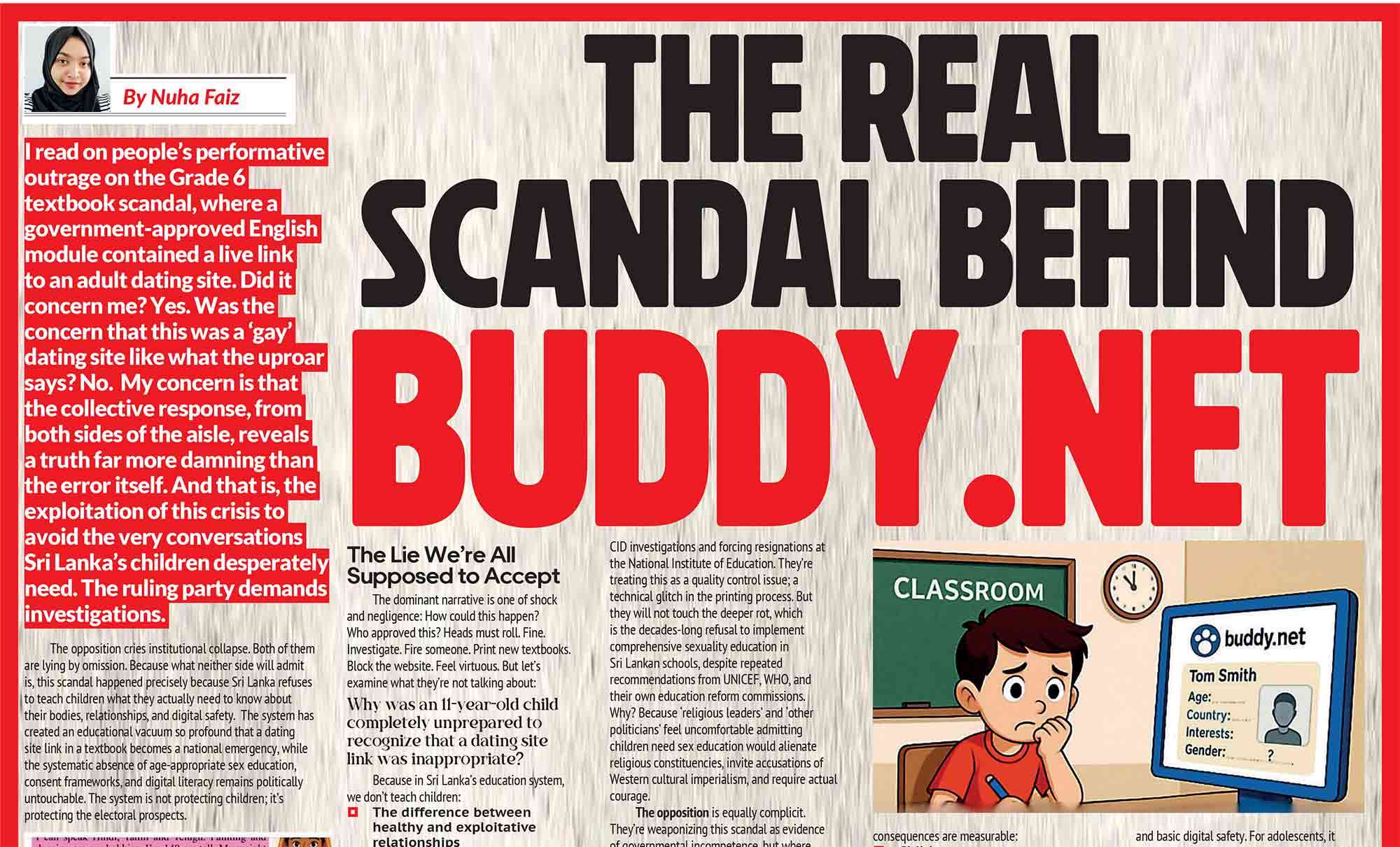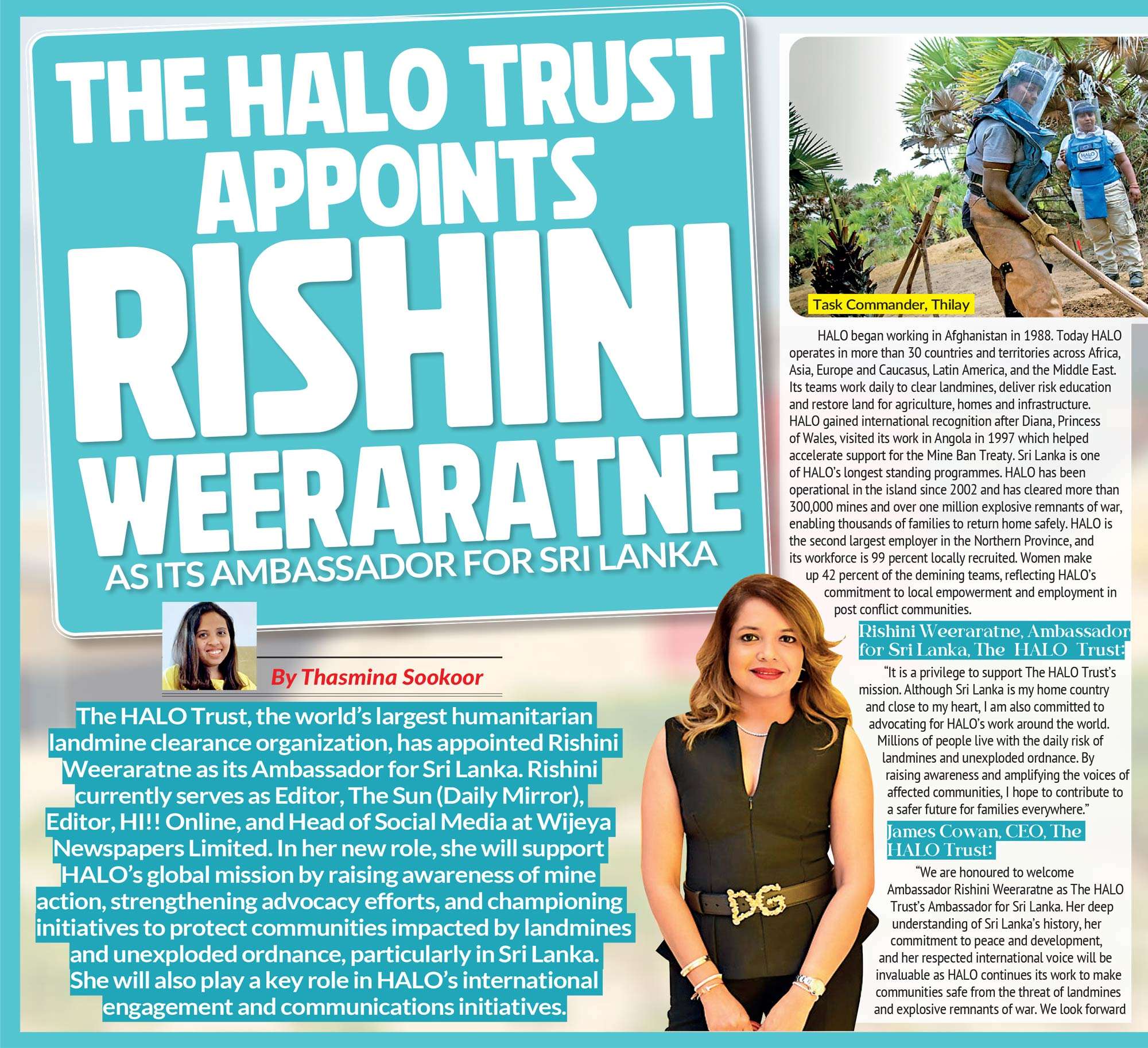
 For decades, Watawala Tea has been a household name in Sri Lanka. Its golden packets and warm family-oriented commercials have been associated with comfort, tradition, and national pride. Few brands occupy the emotional space that Watawala does in the Sri Lankan imagination. It is the tea that sits on breakfast tables from Jaffna to Galle, the tea offered to guests, the tea that evokes home. Which is why the storm that brewed this October around the company’s latest advertisement took many by surprise.
For decades, Watawala Tea has been a household name in Sri Lanka. Its golden packets and warm family-oriented commercials have been associated with comfort, tradition, and national pride. Few brands occupy the emotional space that Watawala does in the Sri Lankan imagination. It is the tea that sits on breakfast tables from Jaffna to Galle, the tea offered to guests, the tea that evokes home. Which is why the storm that brewed this October around the company’s latest advertisement took many by surprise.
What began as a short film about love, family, and acceptance turned into one of the most polarising marketing controversies Sri Lanka has seen in years. The advertisement titled Him, Her and Them was released online earlier this month and was meant to highlight the idea of embracing individuality within the warmth of family life. Instead, it sparked a nationwide debate on morality, modernity, and the role of brands in shaping social conversations. Within days of its release, Watawala Tea withdrew the video from all its platforms following a wave of public criticism, online outrage, and calls for boycotts.
The three-minute film, produced by a Colombo-based creative agency, opens in a quiet suburban home. A young boy is shown dressing in a way that does not conform to traditional gender expectations. He is curious, playful, and imaginative, but his father appears visibly uncomfortable. The mother, portrayed with tenderness, intervenes. She encourages her husband to allow their child to simply be who he is. The film closes with the family sitting together at the breakfast table, sharing a pot of tea. A gentle voiceover suggests that love and understanding are the true foundations of family.
At first glance, it was a tender story that many might have read as a call for empathy within the home. But for many Sri Lankan viewers, the film went too far. Almost immediately, social media erupted with criticism. Commenters accused Watawala of “promoting foreign values” and “normalising inappropriate ideas.” Within twenty-four hours, the ad was being denounced on Facebook and WhatsApp groups as an attempt to “push an agenda” on gender and sexuality. The language of the backlash was intense. Some users called for a complete boycott of Watawala products. Others expressed disappointment that a beloved local brand would “import Western ideologies” into the Sri Lankan family setting.
The debate grew as news outlets and bloggers picked up the story. Religious figures and conservative commentators weighed in, claiming that the commercial undermined traditional Sri Lankan values. Online discussions soon divided into two camps. One argued that the ad was a step toward inclusivity and compassion, while the other saw it as a dangerous intrusion of liberal social ideas into a conservative cultural landscape.
Faced with mounting criticism, Watawala Tea released an official statement on October 15 announcing that it had decided to withdraw the short film. The company said that the intention behind Him, Her and Them was to portray “the everyday emotions of family life and the balance between strength and sensitivity.” The statement emphasised that Watawala had never sought to provoke discomfort or division. “Our intention was to celebrate the values that bring families together,” the statement read, “not to challenge the beliefs that hold our society in unity.” The company added that it had removed the film “out of respect for the shared values that unite Sri Lankan families.”
The apology was swift but did little to quell the conversation. Supporters of the ad criticised the withdrawal, calling it a retreat from progress. They argued that Watawala had missed an opportunity to champion tolerance and open-mindedness. Many young Sri Lankans expressed frustration online, noting that the advertisement’s message of acceptance was neither political nor radical. For them, the outrage revealed how resistant parts of society remain to discussing gender, identity, or difference in any public form.
Others saw the company’s decision as pragmatic. Sri Lanka remains a deeply traditional society, particularly when it comes to family structures and gender roles. While urban youth culture has grown more liberal, rural and middle-aged audiences, Watawala’s core consumers, tend to view issues of gender and sexuality through a conservative lens. Marketing experts pointed out that Watawala’s quick retraction reflected an awareness of its brand base. As one industry analyst put it, “When your product is sold in every grocery shop in the country, you have to be careful about which conversations you lead.”
Yet the controversy raises a larger question about the evolving relationship between brands and social values. In recent years, global advertising has embraced diversity and inclusivity as marketing themes. From multinational fashion houses to beverage companies, brands have increasingly positioned themselves as socially conscious. But the results have been uneven, particularly when these messages are adapted for markets where cultural and religious sensitivities run high.
In Sri Lanka, that tension is especially visible. The island’s advertising landscape has long relied on images of the nuclear family, respect for elders, and the central role of motherhood. Rarely do mainstream campaigns address questions of identity or individuality. In that context, Watawala’s short film felt both bold and unfamiliar. It attempted to humanise difference, to depict a household negotiating change with tenderness. But in doing so, it collided with long-held ideas about what it means to be “normal.”
Commentators have noted that the public reaction to Him, Her and Them mirrors the broader unease surrounding conversations on gender and sexuality in Sri Lanka. While there is growing visibility for LGBTQI individuals in urban areas, mainstream acceptance remains limited. Many people still perceive such topics as foreign imports rather than lived realities within Sri Lankan communities. The controversy over the Watawala ad, therefore, was not merely about a brand. It was about the struggle between tradition and transformation that defines much of contemporary Sri Lankan society.
For the advertising industry, the episode has become a cautionary tale. Creative professionals are now debating how to balance social storytelling with cultural sensitivity. Some argue that Sri Lankan brands should be braver, pointing out that art and advertising have always pushed boundaries. Others say that activism has no place in commercial marketing, especially for legacy brands that cater to mass audiences.
Yet there were also quiet voices of support amid the uproar. A handful of human rights activists praised Watawala’s creative team for attempting to start a difficult conversation. One commentator on X, noted that “even if they pulled it down, the ad did what art is meant to do, it made people think.” The video itself, though officially removed, continues to circulate on social media, where it is being shared by those who believe its message deserves to be seen.
What makes this controversy particularly striking is how it unfolded in a country that takes enormous pride in its tea heritage. Tea is not just an industry in Sri Lanka. It is a symbol of identity and unity. Watawala, as one of the largest producers, has long benefited from that emotional connection. Its commercials have traditionally celebrated warmth, hospitality, and togetherness. By touching on a theme as delicate as gender identity, however subtly, the company entered unfamiliar terrain. For many consumers, it was unsettling to see a beloved tea brand associated with a conversation they found uncomfortable or confusing.
From a communications standpoint, the crisis has been managed with restraint. Watawala’s statement avoided confrontation and refrained from criticising either supporters or detractors. Industry observers noted that the company’s decision to act quickly helped prevent further escalation. However, the silence that followed has left room for speculation. Some viewers wondered whether Watawala would stand by its creative team privately, while others speculated that the agency might face internal repercussions. Neither party has publicly discussed the process that led to the ad’s development or approval.
The incident has also reignited debate about corporate responsibility. Should brands reflect society as it is or as it aspires to be? Should they mirror public opinion or challenge it? In countries like Sri Lanka, where cultural identity is deeply intertwined with religion and family values, these questions carry added weight. A single creative decision can ripple across the national psyche. The Watawala controversy underscores a moment of cultural reckoning. It shows how fragile the boundary has become between commerce and conscience. It also reveals a generational divide. Younger Sri Lankans are increasingly exposed to global conversations about gender equality and self-expression. Older generations, shaped by traditional norms, often view those ideas with suspicion. The result is a clash not only of values but of worldviews. The internet amplifies both sides, turning what might once have been a minor backlash into a full-blown national argument.
In the days since the ad’s removal, Sri Lankan social media has continued to debate what happened. For some, Watawala’s decision represents the triumph of cultural guardianship. For others, it marks a missed opportunity to normalise empathy. Between these two poles lies the reality of a society still negotiating its path between heritage and modernity. What remains clear is that Him, Her and Them will be remembered as more than an advertisement. It has become a mirror reflecting the anxieties and aspirations of a country in transition. Whether Watawala intended it or not, the short film has forced a conversation that will not easily fade. In an age where every sip of tea carries a story, this particular cup has reminded Sri Lankans that even comfort brands cannot escape the turbulence of social change.











